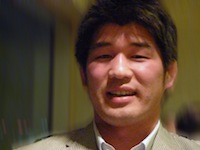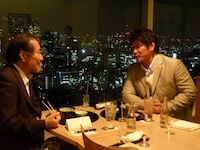A new mission for Kosei Inoue
Kosei Inoue (33), after retiring from active competition with an outstanding record that includes gold medal (100-kilogram category) at the Sydney Olympics, was sent to Great Britain by the Japan Olympic Committee (JOC) on a two-year study tour from January 2009 through January 2011. In a report presented after his return to Japan, he spoke with tangible ardor of how his conviction of the value of judo had grown all the stronger and that he hoped to devote his efforts toward furthering its sound development around the world. During his tour, he made it a point to mix with British society and also visited over 20 nations in Europe and North America for workshops and exchanges. Inoue is one of Japanese judo’s few young leaders to act with an international outlook, and I place great hope in his future course.
Now that he has returned to Japan, Inoue is constantly busy teaching students and judo team members in his positions as full-time lecturer in the Martial Arts Course at Tokai University, assistant manager of the university’s judo team and Japan Judo Federation coach of the national men’s team. As he laments how little time he has to spend at home with his wife and two small children of three and one, his expression is full of a warm human tenderness not visible when he is out on the tatami.
Kosei Inoue has only just moved from first-class competitor into the field of teaching, but his prospects are already drawing attention. On an evening in late autumn, we had some time for a good talk after he had rushed over following a practice session with the national team. In something over two hours in a relaxed atmosphere, one could catch his personality and thoughts and actions. It seems the period in Great Britain has broadened his sights and provided new stimulation for his coming career.
The following, captions included, is the writer’s summary of Inoue’s words.
(November 19, 2011 Gotaro Ogawa)

The value and significance of judo to the world
Starting with Great Britain, one result of my exchanges in many nations is how it impressed me how earnestly people of wide-ranging professions and age groups are working at learning both the techniques and manners of judo. And, watching the way these men, women, boys and girls of all ages were enjoying themselves as they practiced, I felt it might have something to do with a value judo holds. It’s something I hadn’t thought about during all my years as a player.
From experiences like these, I found anew that there was something wonderful about judo. I myself think it would be good if we could get more people involved so the correct way of teaching judo could spread through the world, and I’d like to think it over and do whatever I can to help.
Feelings on today’s judo
When I look at recent trends in judo around the world, I question whether something isn’t rather going against the spirit of “jita kyoei (mutual benefit).” Generally speaking, too much emphasis is being put on competition, and it’s causing problems. One is that a gap has developed among the 200 member nations and territories of the International Judo Federation (IJF). I mean, there’s a lack of consideration for the financially poorer nations and territories. For example, there are problems with things like some countries not being able to send players to international tournaments because hotel fees are too expensive, and under the point system, how to help players who can’t get points because their nations can’t afford to send them.
We mustn’t ever forget the judo spirit of “mutual benefit.” The players taking part in international tournaments aren’t the only ones who keep judo going. In order for it to spread fairly around the world, we need something like special provisions for less advantaged nations and territories. We need to give more thought to bolstering support for them.
While overseas, I met many people who’ve spent years abroad teaching judo. I feel there’s a need to give more consideration to the people around the world, including here in Japan, who are giving their full-out efforts for its advancement. In no few places, those in charge are getting old and have nobody to replace them, but on the other hand, I know there are some among our young judoka who’d like to do what they can do abroad. It seems an unfortunate waste not to match supply and demand.
Rallying talent for judo
Japanese judo circles tend to concentrate into groups of those who graduated from the same school. And, from the aspect of aiming for medals, their stance toward other nations is not always open. For example, some are against Japanese instructors giving judo training to players from nations that could be our rivals. I agree we need to think about making our old schools or Japan stronger, but from a broader standpoint, it’s also important to think about the spirit and sound development of judo in the world as a whole. When foreign players who have risen with the training of Japanese instructors defeat Japanese players, then Japanese judo, too, will grow stronger by defeating them anew.
In Japan as well as abroad, judo circles have a lot of concerns to deal with. Overcoming them takes the help of many people. I feel it’s important that, without sticking too much to school or national sentiments, we think from the position of “Judo” as “All-Japan” and rally together a lot of people with the talents we need. Even if they don’t have records as competitors, I think it would be good to open the way so that people in business and other fields with some experience in judo, and also others with an interest, could play a part in judo’s development. In international concerns, I think it’s extremely important that Japan, as birthplace of judo, heighten her voice and leadership, including on manners and respect. To heighten her leadership on the international level, I think one thing we need is to train and dispatch people who can play an active role in the IJF and the Asian Judo Federation. For that, I’m aware of things like the importance of election campaigns. Whether dealing with technical instruction or international matters, we’re in an age where the constant, well-planned training of competent personnel is even more important than ever.
Japanese judo should be strong: how to train for that?
In my position as a coach for the national team, the charge that our men’s heavyweight categories haven’t been showing results stings. I myself, after all, feel strongly that Japanese judo should be strong. From that angle, especially with the heavyweight category players, the first task is how to get them to strengthen their consciousness of being representatives of Japan. Also, given that the average physical skill level of Japanese children has shown a big drop recently, and that the Japanese are genetically inferior to athletes from nations like Jamaica when it comes to the ability to move in a sudden spurt, we need to put in more research and come up with more novel ideas for how to win against foreign players.
As for training methods, we of course have to go through hard, long, strict practice, but I think it’s also necessary to listen to the views of the players and coaches and various other professionals putting up with all the changes in current rules, make training methods better fit to current needs and come up with more ideas for what material we include in training sessions. On the latter, I first of all want to give players more practice in the grappelling(kumite) and leg techniques(ashiwaza). We have to put more emphasis on training players to get in ahead with their own grappling forms before they’re out-grappelled by physically stronger foreign players. Also, it works to your advantage if you can trigger changes and move your opponent with things like leg techniques to switch the bout from standing into ground techniques(newaza), but to do that, we need to work harder to master leg techniques and go through rigorous, repeated drilling in ground techniques. The weight of ground techniques is small in recent international matches, but it’s to our advantage if we can command the skills for using them to win. These days, you find cases of players who can’t figure out how to get through the moves of ground techniques. I want to get the players to fully master them. The judogi that changed after the amendments to the rules also help make it effective when you know how to use stranglehold techniques.
One more thing, we have to do even more than ever to analyze the training sessions and matches of overseas players. Japanese players are being analyzed minutely in other nations. I think it’s important that we look at the world situation and strengthen our information gathering, including on how training is conducted in other nations, and do further research on overseas judo.
Aims for the future
On what I do from now on, I’ve just entered the path as an instructor and for the time being would just like to accumulate experience, and if I reach a position where I can think of making greater use of my influence, I hope then to go on to put my own thoughts into practice. Towards that end, I want for the time being to accumulate all the experience I can, and learn all kinds of things about judo from many people so I can make use of it in my own future work.
It is my hope to contribute toward the sound development of judo from a broad perspective that crosses beyond the way things have been done up until now.
(Translator: es )
